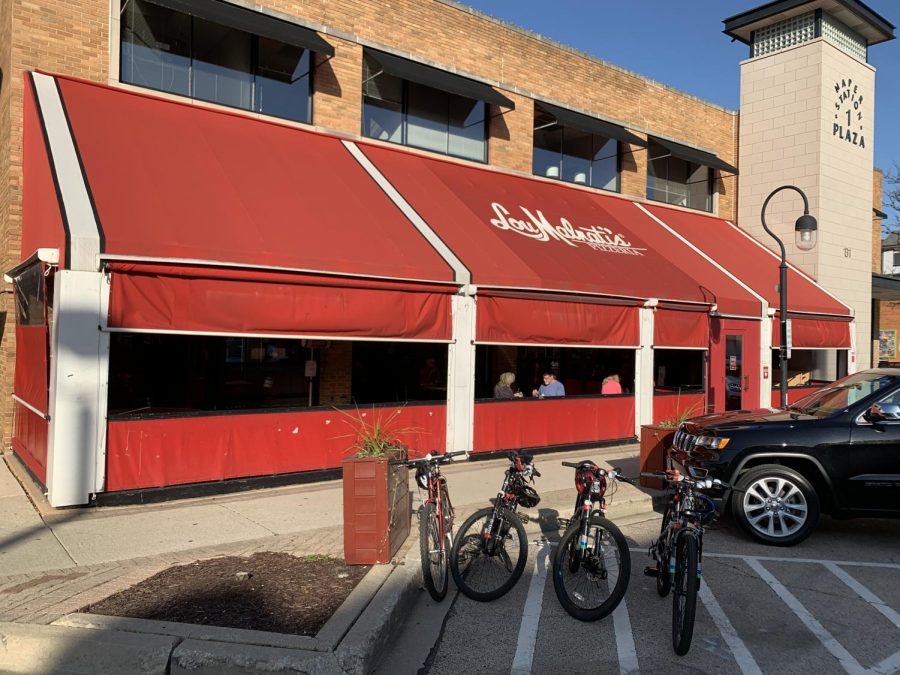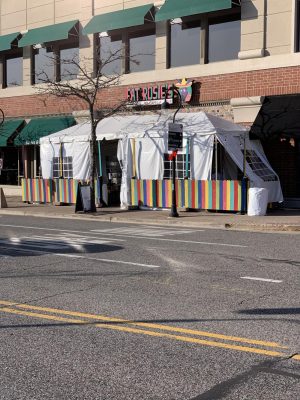New COVID-19 restrictions are set in place just as Naperville restaurants get into pandemic routine
As winter approaches and COVID-19 restrictions become more stringent, many Naperville restaurants, like Lou Malnati’s Pizzeria, are looking to enclosed outdoor seating as an option to offer in-person dining experiences.
November 17, 2020
Naperville’s restaurant scene continues to navigate the restrictions imposed by Gov. J. B. Pritzker’s orders in response to the COVID-19 pandemic.
As of Nov. 4, Pritzker ordered all Illinois restaurants to halt indoor dining in response to a recent spike in cases in the state. While some suburban restaurants decided to follow the governor’s orders, others defied them.
The Central Times spoke with Fat Rosies, Everdine’s, Lou Malnati’s and Empire Burgers and Brew on how the latest mandates have affected their businesses.
As dining in has become less popular, the increased usage of food delivery apps such as Uber Eats and DoorDash have brought in many new sales.
Felipe Gonzalez, an employee at Fat Rosies, revealed that before the pandemic, the average delivery sales for a Saturday night were around $300. During COVID, this average rocketed up to around $2,000.
Still, despite the increased sales, Gonzalez said that they could not survive solely off of takeout orders and in-person sales will be necessary.
With the weather getting colder, Alicia Scavenger, a front of house manager at Empire, said the restaurant hadn’t finalized outdoor seating plans yet.
“We’ve talked about a couple different options of trying to do outdoor seating that’s enclosed and heated,” Scavenger said.
Fat Rosies, however, is taking a different approach.
“We’re just gonna stick with inside and hope for the best,” Gonzalez said. He also mentioned using their outdoor tent as a last resort. While the indoor seating looked to be socially distant, this plan does in fact defy the governor’s orders.
In addition to changes in seating arrangements, restaurants have had to increase their sanitation processes. Nick C., a manager at Lou Malnati’s, who declined to provide his last name, described their in-depth COVID-19 cleaning protocols including a two-minute peroxide table sanitation, cleaning and temperature logs, staff health screenings on a daily basis and even mandatory hand-washing timers. Being a popular Chicago chain, Lou Malnati’s has had to be very thorough with their sanitation to ensure their business does not close down.
Many restaurants have also had to reduce their normal maximum capacity for customers.
Sarah Bahk, a shift manager at Everdine’s, said the restaurant has drastically adjusted their maximum capacity for customers from before the coronavirus from it’s already small maximum seating of about 30 down to roughly 15 customers.
More than anything else, the staff at all of these restaurants agreed that the uncertainty of the pandemic is what worries them the most.
“[Our biggest worry is] trying to assure our staff that their jobs will be waiting for them [when the pandemic ends],” Scavenger said.
To ease the staffs’ stress, some of these restaurants have actually promised to provide for employees by supplying them with groceries and other basic items if necessary.
As COVID-19 conditions continue to evolve, restaurants will be forced to adapt to new guidelines and restrictions in order to stay in business. Eight months into the pandemic, and it seems that the only thing that is constant is change.








